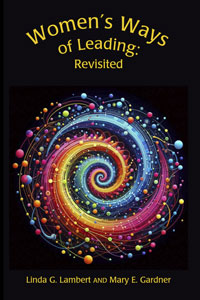Leadership
« Older EntriesWomen’s Ways of Leading: Revisited
Friday, February 7th, 2025
Now Available!
 Women’s Ways of Leading: Revisited invites the reader into a journey of self-discovery informed by a fresh definition of leadership and an original Framework of Women’s Leadership. Based on the studies of women across multiple fields and the latest sciences, stories emerged of remarkable women who have reframed power in pursuit of women’s ways. The authors set forth provocative possibilities…
Women’s Ways of Leading: Revisited invites the reader into a journey of self-discovery informed by a fresh definition of leadership and an original Framework of Women’s Leadership. Based on the studies of women across multiple fields and the latest sciences, stories emerged of remarkable women who have reframed power in pursuit of women’s ways. The authors set forth provocative possibilities…
“Lambert and Gardner’s new work is even more powerful than its earlier version. The authors write convincingly of women’s journeys toward leadership across cultural, professional and political dimensions. Now, through stories, fresh research and in-depth analysis, they provide the impetus for women everywhere to move forward with courage…”
Sumedha Mona Khanna, MD. Former Director, UN World Health Organization, author, Dancing Feet in a Man’s World—a Woman’s Journey Across Cultures to Herself (2023).
“The moment could not be riper for Women’s Ways of Leading: Revisited, a book of stunning originality and power. I have visceral memories of being a young leader, trying to map my behavior to the male leadership models around me. Inevitably, I made many missteps as I acted outside my own values in an effort to fit in. This book feels like liberation for both women and men.”
Kristine Kern, Co-Founder, Realize, consultant, MBA, Columbia University, UC Berkeley Hass School of Business
Posted in Leadership, non-fiction | No Comments » | Leave a Comment




